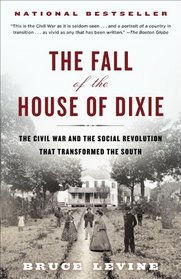If, like me, you've encountered Southern Mythologists, or otherwise seemingly intelligent people, who claim the American Civil War wasn't about slavery, it will help you to have read this book. The book lays bare the evils of slavery and slave owners and their defenders. It also points out the hypocrisies of those slave owners and others who believed their "peculiar institution" was righteous.
I would write a longer review, but I believe the description of the book on its page does a better job than I could do.
I really didn't notice any outstanding errors in the book. There was once place toward the end where the author claimed "three-quarters of a million" soldiers were killed. But the usual accepted number is about 622,000-650,000. Not that those lower numbers are any source of consolation.
I would write a longer review, but I believe the description of the book on its page does a better job than I could do.
I really didn't notice any outstanding errors in the book. There was once place toward the end where the author claimed "three-quarters of a million" soldiers were killed. But the usual accepted number is about 622,000-650,000. Not that those lower numbers are any source of consolation.




![header=[] body=[Get a free book credit right now by joining the club and listing 5 books you have and are willing to share with other members!] Help icon](/images/question.gif?v=90afaeb39)
